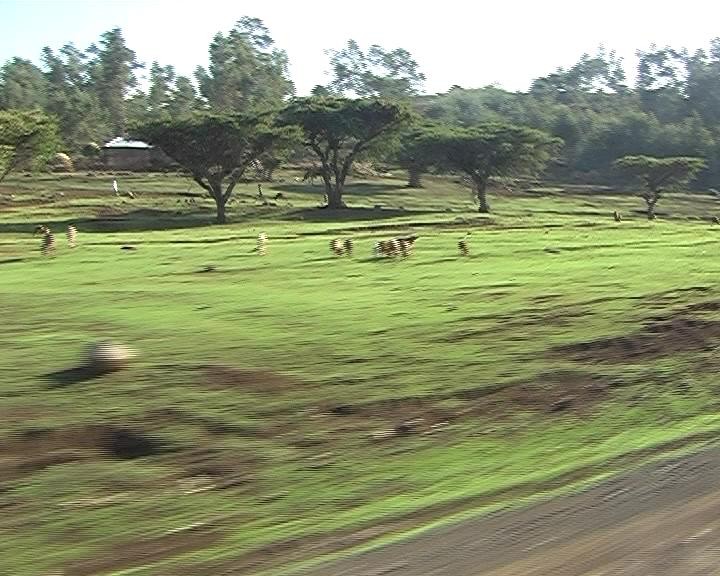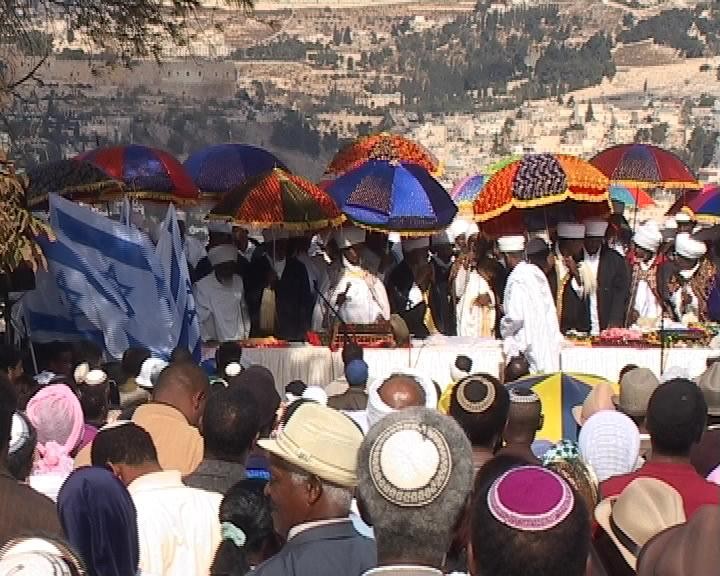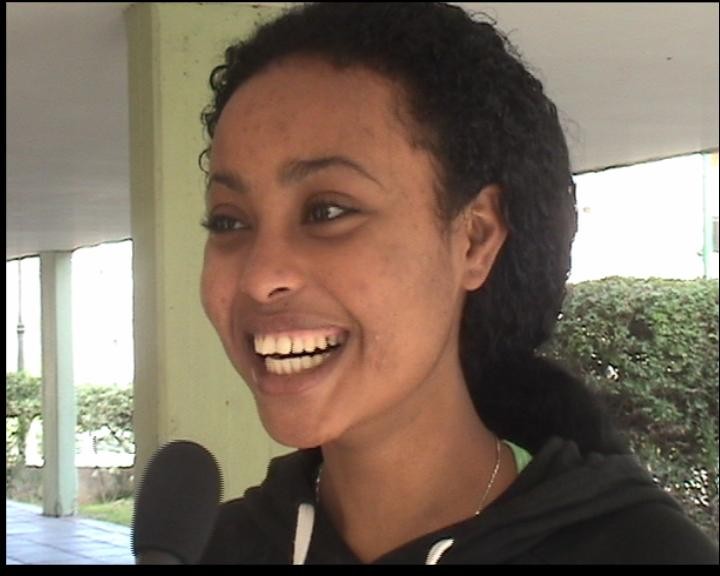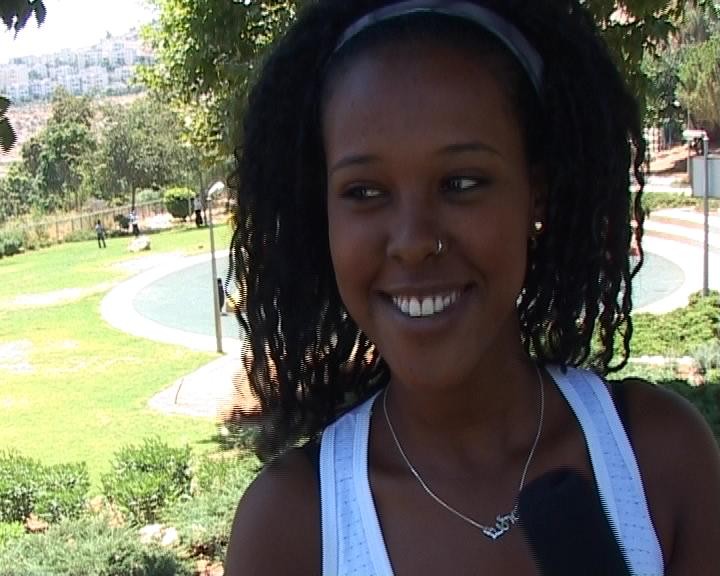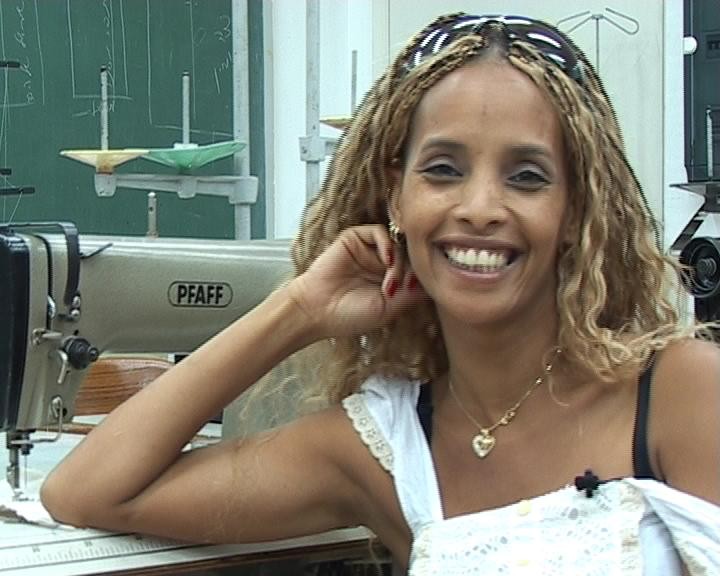Ethiopian Jews' multiple names reflect the richness, wisdom and beauty of their culture -- and every name tells a story. In the film, young Ethiopian Israelis share their journeys toward their names: stories of love and connection, survival and loss, anger and pride. The characters' original names – changed without their consent upon arrival in Israel – take them back to their childhoods in mountain villages, to the hunger and fear in Sudan, to longing for loved ones who died or disappeared on the journey to Israel, to denial of their identity…and reclamation of their roots.
Synopsis
Ethiopian Jews' multiple names reflect the richness, wisdom and beauty of their culture -- and every name tells a story. In the film, young Ethiopian Israelis share their journeys toward their names: stories of love and connection, survival and loss, anger and pride. The characters' original names – changed without their consent upon arrival in Israel – take them back to their childhoods in mountain villages, to the hunger and fear in Sudan, to longing for loved ones who died or disappeared on the journey to Israel, to denial of their identity…and reclamation of their roots.
Festivals
- Ethiopian International Film festival, 2015
- Norton Museum of Art, Palm Beach, USA
- Rwanda International Film Festival, 2015
- Addis Ababa International Documentary Film Festival, Ethiopia, 2014
Press & Links:
"This is a well-made film that powerfully illustrates the price that one pays for identity. The price, both cultural and social, that Israeli Ethiopians are made to pay for forcibly changing their names upon arrival in Israel."
Rabbi Ayala Ronen-Samuels,
Tefilat Ha'Adam SynagogueI loved the film, which I found very moving and multilayered beneath its deceptive, elegant simplicity - weaving a political level (the fracture lines in Israeli society and the challenges of absorbing a new diaspora while preserving its sense of self), a cultural and religious level (bringing to life a whole segment of our Jewish history we didn't even know existed; instant kinship with unknown brothers; and recovery from amnesia), and most of all a deeply personal, intimate level (admitting the audience into the privacy of these people's lives; lifting the veil; a potent, heart-wrenching stretch between loss and pride, defiance and nostalgia). Above all I loved the film's humility - the way the director/interviewer is all ears and eyes, never grabs the spotlight, but gives these people voice and makes them sing so beautifully - and in so doing makes her own love and appreciation of them and their story so palpable.”
Antoine Halff, board member, Union for Traditional Judaism
“A novel and evocative window into the Ethiopian Jewish experience and the complexities of integrating into Israeli society. If you do any programming at all in the Jewish community, I urge you to take a look at Ruth's film. It will surprise you”
Joan Leegant, novelist
“You returned to us our lost honor.”Yitzhak Adamka, Ethiopian Israeli activist
“Unlike many films that impress because of the camera’s fancy lenses, These are my Names impresses because of its social value. The film enables serious discussion about similarities and differences, shakes up the shadowy bases of our perceptions, and leads to discomfort and conflict in the positive sense…it allows people a peek into the rich culture of the Jews of Ethiopia.”Asher Rachamim, Ethiopian Israeli activist and trauma counselor
“This beautiful and touching film captures the faces, feelings, and personal stories of Ethiopian Jews in Israel… It deals in sensitive ways with the intersection of their links to their native land and their minority status in Israel...”Edith Bruder, President, International Society for the Study of African Jewry
“Little did I realize how powerful this film would be…it touched the young audience in an unbelievable way…an unbelievable trigger for a discussion on identity among Ethiopian-Israeli youth…”Esti Moskowitz Kalman, Deputy Director, Makom, The Jewish Agency
In a short amount of time you spotlighted, in a microcosm, an important aspect of the treatment of Ethiopians Jews. You showed us a bit about their trek and sufferings to reach Israel. You made us think about the importance of names …to all people.Harold Steinbach, advisory board member, JBI (formerly JewishBraille Intl) and partner, Steinbach and Associates
“The film asks, who am I and what am I doing here?”Titina Kebedeh, Ethiopian Israeli actress
“I have not had such an enjoyable, sad and real experience in a long time. Wonderfully edited.”Malka Melamed, former national director of the NCJW Research Institute for Innovation in Education, Hebrew University
“Outstanding. I was glued to my seat.”Gila Cohen, Director, Film Archives, Bet Hatfutzot-Diaspora Museum
“You have returned to us our lost honor.”
Yitzhak Adamka, Ethiopian Israeli youth worker
This beautiful and touching film captures the faces and feelings, and personal stories of Ethiopian Jews in Israel It tells us their dream to become accepted and integrated without losing their own character, identity and values.... ... Reveals , in their own words, their long and dramatic way to integration.... Deals in sensitive ways with the intersection of their links to their native land and their minority status in Israel...
Dr Edith Bruder
President of the International Society for the Study of African Jewry
In the film, one of those interviewed states, “We were given Hebrew names without thinking about our past, we were told, ‘You are new people and you will start from the beginning.'"
For the entire review by Ruth Eglash/The Jerusalem Post, check:
http://www.jpost.com/ArtsAndCulture/Entertainment/Article.aspx?id=191928The names of Ethiopian children names were changed to mainstream Israeli names already at the airport or later in absorption centers, schools, kindergartens, according to Mason. "The motivation was a good one - to help them integrate. But they didn't realize what they were doing. They also never asked permission of the parents and they didn't realize what an essential part of their identity these names were, because these names tie people to their parents and grandparents, to their village and to stories that happened before they were born. There are so many layers of meaning, and these were all lost."
For the entire interview with Filmmaker Ruth Mason, check: http://www.haaretz.com/magazine/anglo-file/names-that-bind-generations-1.311849
When is a Name More than a Name? A review on Amy Kronish’s Israeli film blog:
http://israelfilm.blogspot.com/search/label/%22These%20Are%20My%20Names%22Follow the film’s progress on Ruth Mason’s blog: http://thesearemynames.blogspot.com
These are my Names Explores Ethiopian Israeli Identity:
http://israelseen.com/?s=%22these+are+my+names%22 and
http://www.allvoices.com/contributed-news/5733967-these-are-my-names-explores-ethiopianisraeli-identity
People are saying…
“Outstanding. I was glued to my seat.” Gila Cohen, Director, Film Archives, Bet Hatfutzot-Diaspora Museum
“Moving and important.” - Tamar Cohen, Jerusalem Cinematheque
“An important film…I was deeply moved…a very special project…” Chaim Peri, Director Yemin Orde
“These Are My Names is a part of a fascinating story which has yet to be told.” Bob Fenton, Friends by Nature
Deeply personal…multilayered beneath its deceptive, elegant simplicity… potent, heart wrenching stretch between loss and pride, defiance and nostalgia…the director gives these people voice and make them sing so beautifully.” - Antoine Halff, board member, Union for Traditional Judaism
Illuminating….compelling….the music is lovely…” - Linda Frankel, PhD, past president, Chapel Hill Kehillah
“An important message…Thank you for this important work.” - Shoshana Ben-Dor, Director, NACOEJ
“The film is an invitation to a dialogue ..Names are a gate to our culture.” Shmuel Yilma, JDC Israel
“A novel and evocative window into the Ethiopian Jewish experience and the complexities of integrating into Israeli society.” - Joan Leegant, novelist
On May 12, the State of Israel and its 110,000 Ethiopian citizens commemorate the 4,000 Ethiopian Jews who died trying to reach the land of their dreams during Operation Moses in 1984-5.
Thanks to the efforts of Ethiopian activists such as the Israel Association for Ethiopian Jews (IAEJ), for the past two years, the day has been marked by an official state ceremony at Mt. Herzl.
While the 4,000 mothers and fathers, sons and daughters, brother and sisters, aunts and uncles who did not make it to Israel are remembered and cried over, rarely is another group that did not have the privilege mentioned. The survivors find it too hard to talk about them.
These are the missing.
For the entire article by Ruth Mason, check:
http://www.jewishjournal.com/opinion/article/these_are_the_missing_20100512/Mequonent, Kenubish, Dawit, Workenesh. These are some of the names given to Ethiopian Jews before they arrived in Israel between 1984-1991. Their names after immigration authorities got involved? Asher, Ilana, David and Zahava.The story of how Israel changed the names of thousands of Ethiopians – and the pain and alienation that such a seemingly simple action caused an entire immigrant community – is the subject of a short new documentary, “These are my Names.”
For the entire review by Brian Blum, check:
http://www.thisnormallife.com/2010/02/what%e2%80%99s-in-name-for-ethiopian-immigrants-to-israel-a-lotRuth Mason has just released her new documentary about the names given to Ethiopian Jews and the significance of those names for identity. The film offers a novel and evocative window into the Ethiopian Jewish experience and the complexities of integrating into Israeli society. I have viewed the trailer and can't wait to see the full film.
The film would make an excellent addition to any program about Ethiopian Jews or contemporary Israeli society. It would also be an excellent vehicle for discussion for teens in youth groups, schools, or summer camps (a discussion guide for teens is available -- and who doesn't think about the meaning of their names?). If you do any programming at all in the Jewish community, I urge you to take a look at Ruth's film. It will surprise you.
Joan Leegant,
American Novelist
April, 2010
For further updated information about "These Are My Names", check the following blog: http://thesearemynames.blogspot.com
Festivals
- Ethiopian International Film festival, 2015
- Norton Museum of Art, Palm Beach, USA
- Rwanda International Film Festival, 2015
- Addis Ababa International Documentary Film Festival, Ethiopia, 2014
- Temple Beth-El, NJ
- On the Road International Migrant Film Festival, Slovenia 2011
- Sheba Int'l Film Festival, NY, 2011
- Reel Israel Film Festival, Cleveland, 2011
- Nava Tehilah Congregation, Israel, 2011
- Spokane Jewish Film Festival, USA, 2011
- Ramat Hasharon Film Days, Israel, 2011
- Nava Tehilah Spiritual Cinema, Israel, 2011
- Minneapolis Jewish Film Festival, USA, 2011
- Temple Yedidia, Israel, 2010
- Utopia JCC, USA, 2010
- The Jewish Eye Film Festival, Ashkelon, 2010
- Memorial ceremony for the Ethiopian Jewish fallen; Israel, 2010
Educational
- Stanford University
- Colby College
- The National Project for the Ethiopian Jews, Israel
- These Are The Names Conference, London
- UCLA
- University of Florida
- Nefesh B'Nefesh, Israel
- University of Pennsylvania
- Amana Women's Yeshiva, Israel
- Jews & Judaism in Black Africa & its Diasporas Conference - SOAS, UK
- BJE Jewish Community Library
- Arizona State University
- Harvard University
- Fairfield University
- Makom Educators, NY
- Conference about African Judaism, University of London
- Rupin College, Israel
- Ethiopian Jewry: Identity, Heritage, History and Society Conference , Bar Ilan University
- The Fifteenth World Congress of Jewish Studies, The Hebrew University
- Beth Hatefutsoth, Israel
